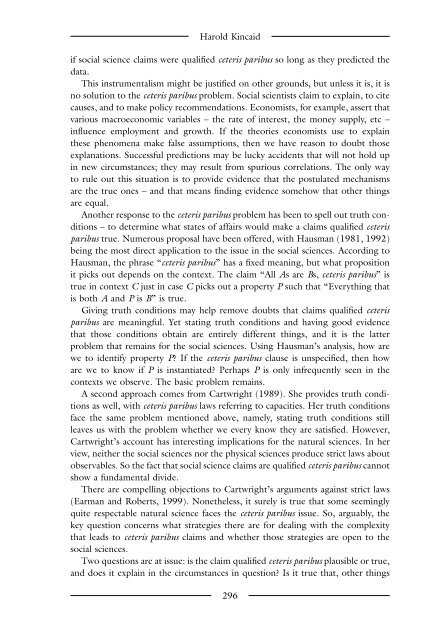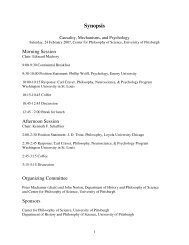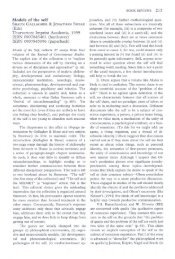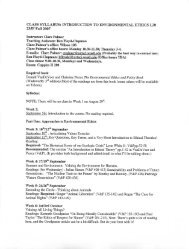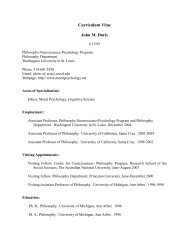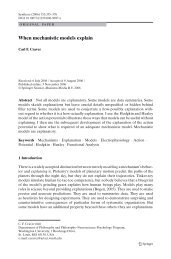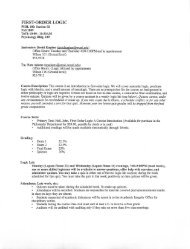The Blackwell Guide to the Philosophy of Science - The Department ...
The Blackwell Guide to the Philosophy of Science - The Department ...
The Blackwell Guide to the Philosophy of Science - The Department ...
You also want an ePaper? Increase the reach of your titles
YUMPU automatically turns print PDFs into web optimized ePapers that Google loves.
Harold Kincaid<br />
if social science claims were qualified ceteris paribus so long as <strong>the</strong>y predicted <strong>the</strong><br />
data.<br />
This instrumentalism might be justified on o<strong>the</strong>r grounds, but unless it is, it is<br />
no solution <strong>to</strong> <strong>the</strong> ceteris paribus problem. Social scientists claim <strong>to</strong> explain, <strong>to</strong> cite<br />
causes, and <strong>to</strong> make policy recommendations. Economists, for example, assert that<br />
various macroeconomic variables – <strong>the</strong> rate <strong>of</strong> interest, <strong>the</strong> money supply, etc –<br />
influence employment and growth. If <strong>the</strong> <strong>the</strong>ories economists use <strong>to</strong> explain<br />
<strong>the</strong>se phenomena make false assumptions, <strong>the</strong>n we have reason <strong>to</strong> doubt those<br />
explanations. Successful predictions may be lucky accidents that will not hold up<br />
in new circumstances; <strong>the</strong>y may result from spurious correlations. <strong>The</strong> only way<br />
<strong>to</strong> rule out this situation is <strong>to</strong> provide evidence that <strong>the</strong> postulated mechanisms<br />
are <strong>the</strong> true ones – and that means finding evidence somehow that o<strong>the</strong>r things<br />
are equal.<br />
Ano<strong>the</strong>r response <strong>to</strong> <strong>the</strong> ceteris paribus problem has been <strong>to</strong> spell out truth conditions<br />
– <strong>to</strong> determine what states <strong>of</strong> affairs would make a claims qualified ceteris<br />
paribus true. Numerous proposal have been <strong>of</strong>fered, with Hausman (1981, 1992)<br />
being <strong>the</strong> most direct application <strong>to</strong> <strong>the</strong> issue in <strong>the</strong> social sciences. According <strong>to</strong><br />
Hausman, <strong>the</strong> phrase “ceteris paribus” has a fixed meaning, but what proposition<br />
it picks out depends on <strong>the</strong> context. <strong>The</strong> claim “All As are Bs, ceteris paribus” is<br />
true in context C just in case C picks out a property P such that “Everything that<br />
is both A and P is B” is true.<br />
Giving truth conditions may help remove doubts that claims qualified ceteris<br />
paribus are meaningful. Yet stating truth conditions and having good evidence<br />
that those conditions obtain are entirely different things, and it is <strong>the</strong> latter<br />
problem that remains for <strong>the</strong> social sciences. Using Hausman’s analysis, how are<br />
we <strong>to</strong> identify property P? If <strong>the</strong> ceteris paribus clause is unspecified, <strong>the</strong>n how<br />
are we <strong>to</strong> know if P is instantiated? Perhaps P is only infrequently seen in <strong>the</strong><br />
contexts we observe. <strong>The</strong> basic problem remains.<br />
A second approach comes from Cartwright (1989). She provides truth conditions<br />
as well, with ceteris paribus laws referring <strong>to</strong> capacities. Her truth conditions<br />
face <strong>the</strong> same problem mentioned above, namely, stating truth conditions still<br />
leaves us with <strong>the</strong> problem whe<strong>the</strong>r we every know <strong>the</strong>y are satisfied. However,<br />
Cartwright’s account has interesting implications for <strong>the</strong> natural sciences. In her<br />
view, nei<strong>the</strong>r <strong>the</strong> social sciences nor <strong>the</strong> physical sciences produce strict laws about<br />
observables. So <strong>the</strong> fact that social science claims are qualified ceteris paribus cannot<br />
show a fundamental divide.<br />
<strong>The</strong>re are compelling objections <strong>to</strong> Cartwright’s arguments against strict laws<br />
(Earman and Roberts, 1999). None<strong>the</strong>less, it surely is true that some seemingly<br />
quite respectable natural science faces <strong>the</strong> ceteris paribus issue. So, arguably, <strong>the</strong><br />
key question concerns what strategies <strong>the</strong>re are for dealing with <strong>the</strong> complexity<br />
that leads <strong>to</strong> ceteris paribus claims and whe<strong>the</strong>r those strategies are open <strong>to</strong> <strong>the</strong><br />
social sciences.<br />
Two questions are at issue: is <strong>the</strong> claim qualified ceteris paribus plausible or true,<br />
and does it explain in <strong>the</strong> circumstances in question? Is it true that, o<strong>the</strong>r things<br />
296


